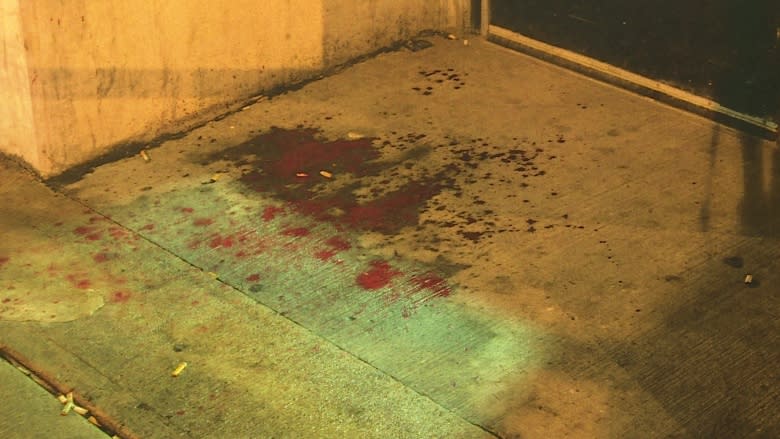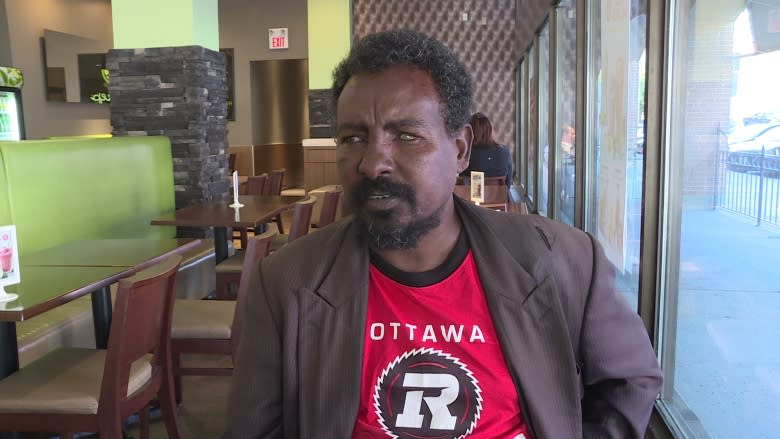Not criminally responsible: legal defence for mentally ill on trial in Ottawa
UPDATED | On Sept. 29 after this story was published, Jeff Weber was found not criminally responsible for attacking Nabute Ghebrehiwet with a hammer. He has now been found NCR four times.
Jeff Weber has been declared not criminally responsible for three serious crimes. Each time a team of mental health professionals carefully managed his reintegration into society. Each time the voices in his head convinced him to lash out once more. Now Weber is on trial for a vicious hammer attack that left an Ottawa man partially blind, and his lawyer is again asking a judge to find his client NCR, an option available to courts when the accused is deemed to have been unable to tell right from wrong at the time of the crime. SIMON GARDNER looks at whether a system designed to help the mentally ill is instead failing them — and putting the public at risk.
Dec. 9, 2014, 6:30 p.m.
As he steps outside his Centretown apartment building for his usual after-dinner cigarette, Nabute Ghebrehiwet has no forewarning he's in grave danger.
In the neighbourhood around Bank and Somerset streets, Ghebrehiwet, 55, is known as a soft-spoken, good natured-man.
On this winter evening though, he's about to become the innocent target of someone who views him in a much different light.
Jeff Weber believes Ghebrehiwet's black skin is a genetic abomination, the outcome of breeding gorillas with reptiles. He's convinced Ghebrehiwet is infected by Satan, and a drug dealer.
The hulking 32-year-old gets off a city bus at the nearby intersection. He's returning from classes at Algonquin College and is supposed to be heading directly to his residence, a transitional group home in Old Ottawa South, about three kilometres away.
Staff at the home, which is owned and managed by a charity called Salus, are unaware of Weber's change in itinerary.
'Psychotic state'
Weber's lawyer, Trevor Brown, would later argue that his client was in a "psychotic state" that evening, the result of his paranoid schizophrenia. The disease is treatable, but in Weber's case the drugs he takes to control his demons sometimes fail, and the delusions persist.
On this evening Weber is seeing visions of people being sexually brutalized and forced to consume human waste. "People choking on piss and shit," as one psychiatrist would graphically describe it in court.
The voices in Weber's head are growing impatient, cajoling him to stop being a coward, to do something to end the terrible suffering.
Weber walks into a nearby grocery and hardware store where he calmly purchases a hammer, knife and calendar. The transaction is caught on the store's security camera. He then exits the store and turns left down Somerset Street W.
Seconds later a hammer smashes into Ghebrehiwet's skull from behind as he stands smoking in a doorway. Blood splatters the sidewalk. Ghebrehiwet falls to the ground.
The hammer blows continue. One of them strikes Ghebrehiwet in his left eye, causing a severe injury that will leave him partially blind.
A witness, university student Hoda Ali, would later testify she heard Weber shouting, "I'm going to get you n--gers! All you n--gers come here, this is what you do!"
A second witness, Alex Diaz, approaches the attacker as the hammer blows continue to rain down on the victim's head.
"What are you doing?" he asks. Weber stops swinging the hammer and turns to his questioner.
Diaz expects to see a face contorted with rage. Instead, he's shocked by the attacker's lack of any emotion, Weber's expression blank as if he's being controlled by a force he's powerless to stop.
"It was like he was running on autopilot," Diaz would later recall.
The attack ends as suddenly as it began. Weber calmly walks away and boards another bus to the Salus home.
Ghebrehiwet is helped into the lobby of his apartment. Paramedics soon arrive and rush him to hospital. Police arrive too, and cordon off the bloody crime scene.
Several days after the attack Ottawa police receive a call. Counsellors with Salus have recognized Weber from an image captured by the video camera at the grocery store, broadcast in a TV news report.
The police take no chances and dispatch their tactical team to the house on Grove Avenue. But Weber does not resist arrest.
He's charged with aggravated assault and possession of a dangerous weapon, and taken to the Royal Ottawa Mental Health Centre to be assessed.
Weber is a familiar face around the Royal. After all, it was less than two months earlier that he was released from the facility to resume living in the community.
System 'repeatedly failed me,' Weber says
"Royal Ottawa Mental Health Centre. How can I help you?"
"I'd like to contact a patient in the secure unit."
In a matter of seconds I'm speaking with Jeff Weber.
He's well-spoken. He sounds perfectly normal. He agrees to tell me his story and answer questions, but only after his current criminal trial is over.
"The mental health system has repeatedly failed me," Weber insists before hanging up.
That may be true, but it's not for lack of trying. The mental health system has poured vast amounts of money and resources into Weber's care and treatment. Teams of mental health professionals have struggled to find a way for him to live something resembling a normal life in the community.
He's been the constant focus of psychiatrists, psychologists, rehabilitation counsellors, registered nurses, outpatient managers, occupational therapists and recreation therapists.
Weber has shown himself to be a motivated patient. Like most 32-year-olds, his goal is to hold down a job and live independently.
But Weber's schizophrenia has a mind of its own, and resists treatment. Over the years, he's been prescribed so much medication his body was found to be toxic.There is evidence he has sometimes stopped taking anti-psychotic drugs, a common trait among sufferers, who may believe they no longer need the pills, or become depressed by their unpleasant side effects.
According to his psychiatrists, Weber often hears voices in his head and sometimes sees visions of cruelty and suffering. He hates crowds and loud noises. He gets easily stressed out, but copes by calming himself down through a technique called cognitive behavioural therapy. If that doesn't work he pops more pills to keep the "disturbances," as his doctors call his terrifying symptoms, at bay.
Influenced by Nazis, The Matrix
Most of Weber's adult years have been spent in and out of mental hospitals, prisons, shelters and group homes.
His latest crime — Weber's own defence lawyer doesn't dispute that his client attacked Nabute Ghebrehiwet — may have been at least partially motivated by his intense dislike of anyone with black skin, according to psychiatrists' testimony at the assault trial. He regards black people as genetic mutations, a racist belief that fits into a broader credo of white supremacy and an idolatry of Nazi Germany.
Weber claims to be a long-lost relative of Adolf Hitler and owns a swastika poster — "my beautiful swastika," he calls it. He's been reminded by staff that he's not allowed to hang the poster on bedroom walls at hospitals or group homes.
His belief system also seems rooted in The Matrix, a 1999 science fiction action film starring Keanu Reeves.
According to documents obtained from the Ontario Review Board — the body responsible for reviewing the status of anyone found to be not criminally responsible or unfit to stand trial on account of a mental disorder — Weber's parents met as patients in a mental hospital. When he was just a toddler, Weber witnessed his father kill his mother, but his father was never prosecuted and died in 2014.
Weber and his two sisters ended up in foster care. "He was sexually abused and neglected while in foster care and, as a result, was moved from foster home to foster home," according to the documents.
In his teens he used drugs and alcohol. He briefly joined the Canadian Armed Forces but was discharged within a year.
Despite his challenges Weber completed Grade 12 and briefly attended Carleton University before enrolling at Algonquin College, where he recently managed to score 85 per cent on an exam.
'Terrorizing symptoms'
Dr. Gary Chaimowitz, chair of psychiatry for the Ontario Medical Association and the head of psychiatry and behavioral sciences at McMaster University, testified for the defence during Weber's trial and described him as "an intelligent individual who is trying to make some sense of his delusional behavior. He is quite perceptive."
But during the same testimony, Chaimowitz also described Weber as "a man who is experiencing bizarre, overwhelming and personally terrorizing symptoms."
Others who testified echoed that observation, including Lindsay Quellette, a registered nurse at the Royal who's been involved in Weber's care for four years.
"I would say he has a very extreme mental illness, something he experiences every day in terms of the intensity and frequency of his symptoms. More frequent than other clients I have worked with," Quellette said.
Why then was Weber allowed to roam around downtown Ottawa on Dec. 9, 2014, the day he attacked Ghebrehiwet?
Or, as James Bocking, the Crown attorney prosecuting Weber, asked at the trial: "Given his history, the violence, the voices commanding him to do things, why would he be allowed to go out into the community?"
That question is especially relevant given Weber's long criminal history. Ontario Review Board documents show that since 2005 he's been charged with more than 25 offences ranging from assaulting police to carrying a concealed weapon to dangerous operation of a motor vehicle.
Many of the charges were withdrawn or resulted in only brief stints in jail and on probation.
'A very unusual situation'
The most serious incidents triggered criminal trials where Weber's lawyers employed the defence strategy of not criminally responsible, or NCR.
The concept behind NCR is that no person should be convicted of a crime if they were not in control of their mental faculties when they committed it. The mental illness itself is not the defence; the defence is that they don't know right from wrong.
When an individual is found NCR on account of a mental disorder, the verdict does not amount to an acquittal. Nor is it a conviction. In the eyes of the court, it is a unique third option designed to help rather than punish.
Weber has been caught up in a dizzying NCR cycle for years. Three times he's been arrested, charged, found NCR, treated, then gradually reintegrated, only to commit another crime to kick off the process again.
It's believed no other person in Canada has matched Weber's dubious record of being declared NCR three times, let alone four, which could soon be the case.
"Never heard of it. Neither has anybody else as far as I know," said Dr. Robert Dickey, staff psychiatrist at the Waypoint Centre for Mental Health Care in Penetanguishene, Ont.
"I don't think I have ever seen this before and I would be surprised if anybody else has seen this before. This is a very unusual situation," Dr. Gary Chaimowitz testified at Weber's most recent trial.
Charges included assault, abductions
In 2006, Weber was accused of threatening a mother and daughter as they walked beside the Ottawa River. He was Tasered and arrested by tactical officers, who found a knife on him.
The following year, Weber was charged with attempting to abduct a 10-year-old girl from the lobby of a Toronto hotel.
In 2011 Weber left Ottawa for British Columbia without the permission of authorities. Outside a fast food restaurant in Kamloops, he forced his way into a car driven by a young woman. He assaulted and terrorized her.
In the woman's victim impact statement, she described living in a state of constant fear. "He knows my name and he knows what town I live in and therefore I worry about my own safety ... How many people's lives need to be torn upside down before the public is safe from this man?"
Yet in that case and the others, Weber was deemed not criminally responsible because of his mental disorder.
"Looking back there were warning signs that the accused might be in some difficulty and he had, at that time, not demonstrated a long period of stability," Dr. Helen Ward, Weber's long-time psychiatrist at the Royal, told the Ontario Review Board after the assault in B.C.
Warning signs?
Were there similar warning signs before Weber's latest crime, the hammer attack on Nabute Ghebrehiwet?
During the trial, Crown prosecutor James Bocking pointed to notes in Weber's patient records from the Royal, and entries in a log book at the transitional home in Old Ottawa South. According to Bocking, both showed Weber was "clearly becoming unwell, but no one on the front lines really did anything about it."
Weber moved into the home on Grove Avenue in Old Ottawa South in October 2014. It's run by Salus, a mental health charity whose employees work closely with the Royal. From the outside the house looks like any other on the quiet residential street,
On the day of the hammer attack, Laura Milne, Weber's primary worker at the home, noted: "JW reported to the writer that he had had disturbances within the past day."
Another worker, rehab counsellor Erick Armstrong, added: Weber showed "a noticeable negative affect, appeared to be sluggish and unkempt, avoiding eye contact with those around him" during a group session at the home.
Staff at the Royal also documented Weber's darkening mood. On Dec. 8, the day before the attack, clinical psychologist Diane Hoffman-Lacombe noted that Weber reported experiencing more "disturbances."
So why didn't Weber's behaviour set off alarm bells? How was he allowed to lash out yet again?
Care plan allowed leeway
Rehab counsellor Erick Armstrong noted during the trial that Weber's care plan, which was prepared by a team of mental health professionals at the Royal, including his psychiatrist, allowed him unusual leeway.
"I've never seen a care plan like that before … It was clear [we were supposed] to leave him be, let him do his own thing," he testified.
Asked if she worried for the safety of the public when Weber ventured out unsupervised to attend college, Laura Milne, another counsellor, testified: "If he was permitted to go at the time I didn't have a concern."
Even when he was a patient at the Royal, Weber was allowed freedom to roam, and visited the nearby Westgate Shopping Centre. On one of these outings, he returned to the hospital and reported that voices had been telling him to hurt someone.
"It's basically trial and error, and it is for all of us," Weber's psychiatrist, Dr. Helen Ward, testified. "With the benefit of hindsight it's real easy to look back and say we could have seen this, and we all could have seen that."
In his testimony at Weber's trial, Dr. Glen Chaimowitz cautioned the professionals tasked with looking after Weber.
"The team will need to do something different managing his risk, because clearly this was not predicted and prevented. So absolutely he will need a much higher level of scrutiny."
Right from wrong
Whether Jeff Weber is declared not criminally responsible a fourth time will be determined in an Ottawa courtroom on Thursday.
There is no question Weber is mentally ill, and evidence presented during his trial left little doubt that he was undergoing a psychotic episode on the evening of Dec. 9, 2014. But psychiatrists who testified at the trial did not agree on whether he knew right from wrong when he attacked Nabute Ghebrehiwet.
Dr. Robert Dickey, who interviewed and treated Weber after the attack, found Weber didn't fit the usual profile of an NCR candidate. "[He] knew that hitting an individual with a hammer was wrong and he could be arrested," Dickey testified.
Ghebrehiwet has reached the same conclusion.
"He knew what was right from wrong. The fact that he came from my blind side to attack me. The fact that he was supposed to be going home but came to my neighbourhood, it makes me think he must have, I don't know, planned it. Maybe that is too much to say, but he must have known right from wrong."







